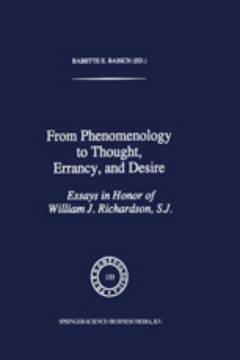Repository | Book | Chapter

(1995) From phenomenology to thought, errancy, and desire, Dordrecht, Springer.
Twenty-five years have passed since William Richardson wrote in his paper, "Heidegger's Critique of Science:"1 "On the longest day he ever lived, Heidegger could never be called a philosopher of science." In saying that Heidegger "could never be called a philosopher of science," he did not mean that Heidegger's philosophy cannot address the problems of scientific knowledge. Rather he meant just that Heidegger himself failed to do so adequately, and for obvious reasons — he was not well versed in science. However, as Richardson put it, "[Heidegger] is a philosopher — an important one — and no genuine philosopher can afford to ignore the problems of science" (p. 511). The paper comprises three parts: 1) Heidegger's analysis of "science"; 2) Heidegger's critique of "science"; 3) comments on the above from the point of view of the writer, which take the form of setting forth challenges to Heidegger's analysis or his critique of "science."
Publication details
DOI: 10.1007/978-94-017-1624-6_35
Full citation:
Heelan, P.A. (1995)., Heidegger's longest day: twenty-five years later, in B. Babich (ed.), From phenomenology to thought, errancy, and desire, Dordrecht, Springer, pp. 579-587.
This document is unfortunately not available for download at the moment.



